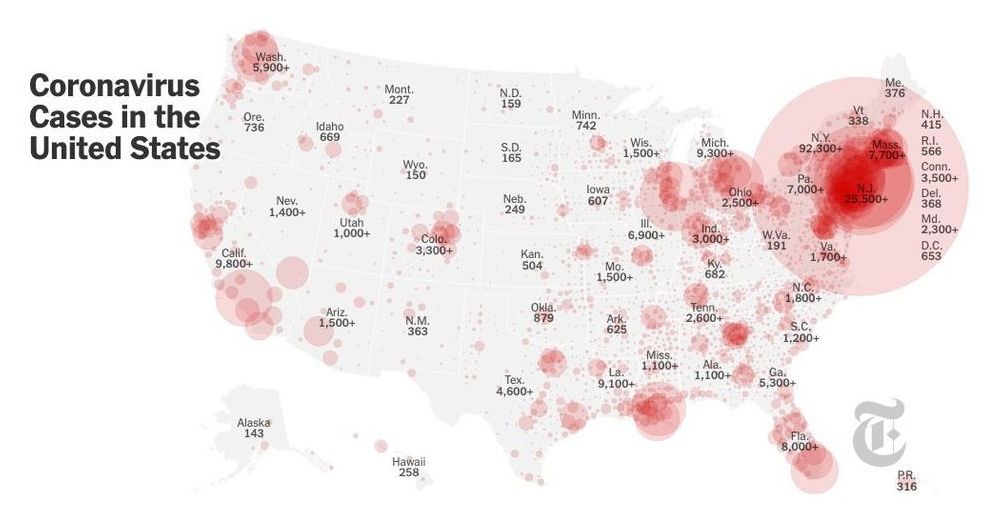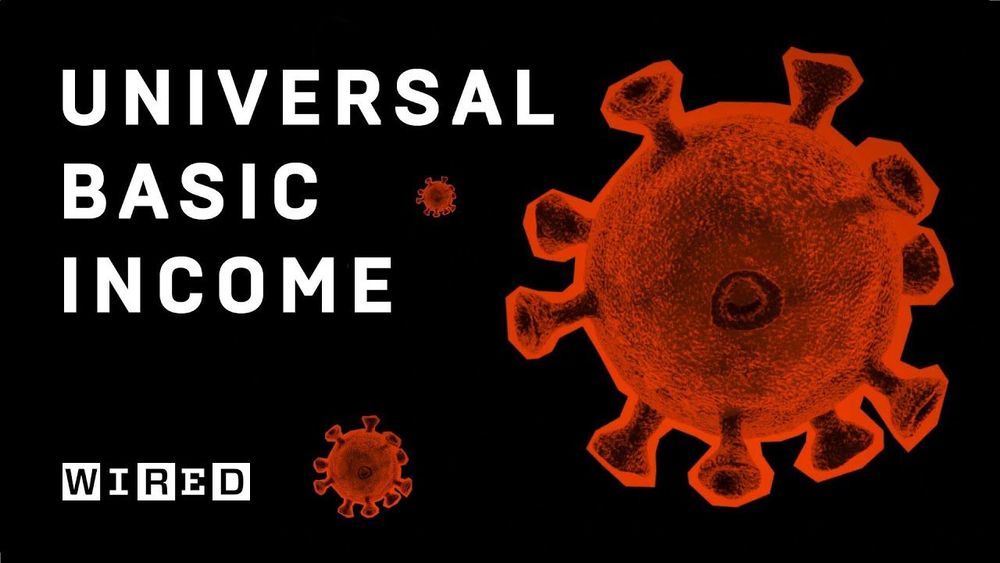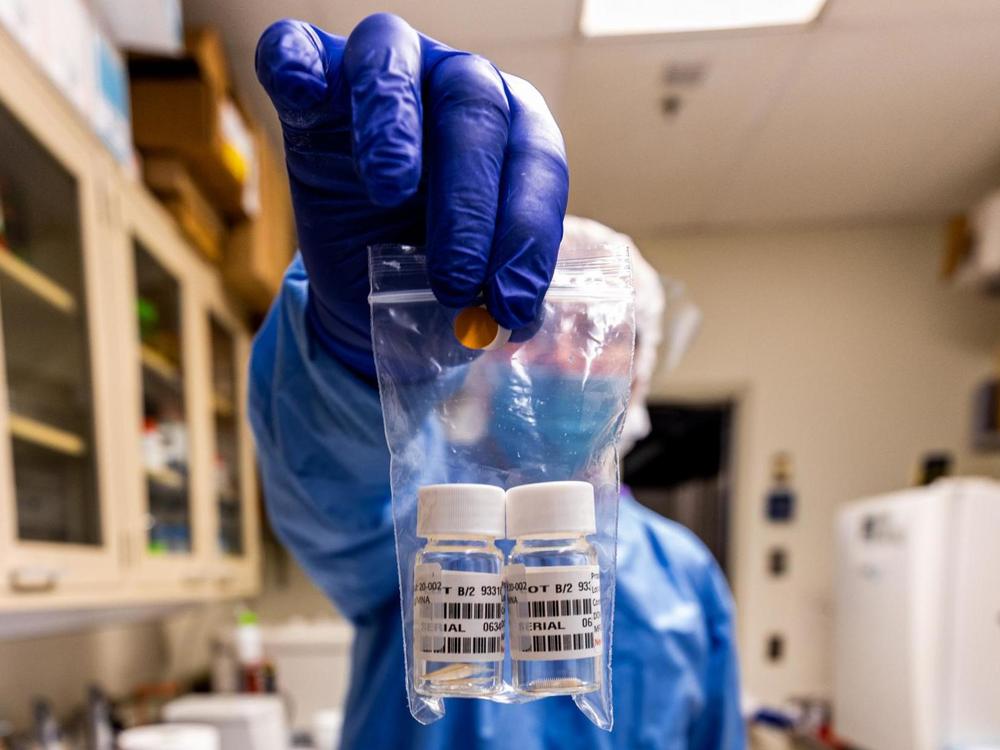A detailed county map shows the extent of the coronavirus outbreak, with tables of the number of cases by county.
Big biotech company Amgen Inc. is joining the race to discover new drugs that can treat the novel coronavirus, the latest drugmaker redirecting resources toward the pandemic.
Amgen, which is partnering with Adaptive Biotechnologies Corp. in the effort, is an unlikely hunter of antiviral treatments. The company, a pioneer of biotechnology, is best known for its drugs for cancer, with other products targeting high cholesterol, kidney disease and migraines.
What is Universal Basic Income (UBI) and how could it help us deal with the coronavirus outbreak? What if… we gave people free money?
The idea of a basic income is that everybody would receive a modest amount paid each week or each month without conditions, paid equally to every man and every woman with a smaller amount to pay for every child.
Advocates for Universal Basic such as Guy Standing, co-founder of the Basic Income Earth Network, argue that it would be the ideal response to the crisis, but that it would also bring huge long term benefits, which he explains in this video.
This video was produced as part of Digital Society, a publishing partnership between WIRED and Vontobel where all content is editorially independent. Visit Vontobel Impact for more stories on how technology is shaping the future of society: https://www.vontobel.com/en-int/about-vontobel/impact/
Emmanuel Solomon Photo
Posted in futurism
The Army is looking at its Plasma Acoustic Shield System as a checkpoint defender, for now. But the original idea – and the long-term goal of the project – is to have it be the first baby step towards a portable, lethal laser weapon.
 The effort, by the U.S. Army’s Advanced Energy Armaments Systems Division and Stellar Photonics, has a lot in common with another military laser project: the Pulsed Energy Projectile being developed by Mission Systems for the Marines. But there are three key differences. The current PEP is a big (450 lb) chemical laser with a limited number of shots, whereas PASS is a small solid-state laser that just needs electricity. The PEP creates plasma by vaporising the outer layer surface it hits (such as your shirt), whereas PASS can create plasma in mid-air by focusing to a point. And PEP fires a single pulse, whereas PASS uses a double pulse which Stellar claim is far more efficient at creating a shockwave.
The effort, by the U.S. Army’s Advanced Energy Armaments Systems Division and Stellar Photonics, has a lot in common with another military laser project: the Pulsed Energy Projectile being developed by Mission Systems for the Marines. But there are three key differences. The current PEP is a big (450 lb) chemical laser with a limited number of shots, whereas PASS is a small solid-state laser that just needs electricity. The PEP creates plasma by vaporising the outer layer surface it hits (such as your shirt), whereas PASS can create plasma in mid-air by focusing to a point. And PEP fires a single pulse, whereas PASS uses a double pulse which Stellar claim is far more efficient at creating a shockwave.
You can get some idea from the Small Business Initiative Proposal the company submitted in ‘04 for a “Man-portable Integrated Laser Assault Rifle”:
Countering China’s Laser Offensive
Posted in military
:ooooo.
China’s military and paramilitary forces have been employing lasers with increasing frequency since at least 2018.
By Patrick M. Cronin and Ryan D. Neuhard for The Diplomat.
Infectious disease
Protein mapping finds 69 potential treatments for COVID-19.
Many are FDA-approved drugs that could be repurposed.
NASA, one of SpaceX’s biggest customers, also prohibits its employees from using Zoom, said Stephanie Schierholz, a spokeswoman for the U.S. space agency.
The Federal Bureau of Investigation’s Boston office on Monday issued a warning about Zoom, telling users not to make meetings on the site public or share links widely after it received two reports of unidentified individuals invading school sessions, a phenomenon known as “zoombombing.”
Investigative news site The Intercept on Tuesday reported that Zoom video is not end-to-end encrypted between meeting participants, and that the company could view sessions.
Retired astronaut Chris Hadfield is spending lockdown searching for a better test for COVID-19, rewiring his stove, and talking to Euronews about what isolation means — and how to deal with it.
Dozens of other teams around the world have potential vaccines in development.
But the Pittsburgh research is the first study on a Covid-19 vaccine candidate to be published after critique from fellow scientists at outside institutions.
The scientists were able to act quickly because they had already laid the groundwork during earlier epidemics of coronaviruses: Sars in 2003 and Mers in 2014.
“These two viruses, which are closely related to[Covid-19], teach us that a particular protein, called a spike protein, is important for inducing immunity against the virus. We knew exactly where to fight this new virus,” said Andrea Gambotto, associate professor of surgery at the Pittsburgh School of Medicine.









